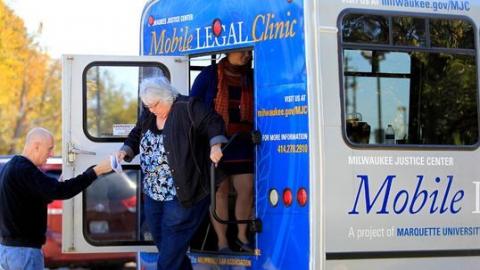Wisconsin Pays Nation's Lowest Rate to Defend Poor. Lawyers Say it's Time for a Raise
Each year, criminal defense lawyer Denise Hertz-McGrath agrees to represent about 50 clients who can’t afford an attorney, most of whom face prison time if convicted.
For her work on those cases, the state pays Hertz-McGrath $40 per hour – barely enough to cover the overhead of her private practice, let alone a competitive rate for an experienced lawyer.
“I think we have an obligation to take these cases,” said Hertz-McGrath, of Kenosha.
Wisconsin’s $40-per-hour rate for private lawyers accepting indigent defense appointments ranks lowest in the country. Prominent lawyers say the rate — which is the same as it was 25 years ago — is so low that the state’s most competent attorneys often don't take the cases.
A group of Wisconsin lawyers plans Thursday to ask the state Supreme Court to increase the rate to $100 per hour, a raise that would place Wisconsin's rate among the highest in the country. The request would cost about $34 million more per year to cover the roughly 55,000 publicly appointed cases.
John Birdsall, a Milwaukee criminal defense lawyer and co-author of the petition, said the $40-per-hour rate "might seem like a lot to a layman," but the costs of office space, insurance, staff and legal services easily eat up that amount.
"It's a very reasonable number, actually, when you take into account all of that," Birdsall said of the $100 rate.
For years, judges and lawyers have questioned whether Wisconsin's rate violates defendants' constitutional right to competent legal counsel.
In 2011, the Wisconsin Supreme Court said there’s “extensive anecdotal evidence” that the pay rate might lead to ineffective lawyers taking criminal defense cases, putting the state at risk of “a constitutional crisis.”
In April, the Milwaukee Journal Sentinel found that about 100 lawyers who accepted dozens of indigent defense appointments never use investigators, a vital part of most criminal defenses.
“If you’re not using experts and investigators, then you’re just being a warm body. You’re just shuffling your client through the system,” Birdsall said. “And if that’s all you’re doing, then, frankly, we’re just wasting money on you.”
Thirty states pay lawyers an hourly rate for work on appointed cases. Most pay about $60 to $90 for work on felony cases, with the rate approaching $100 to $120 for murder cases. Two states, Maryland and Vermont, rank second-lowest nationally by paying $50 per hour for all cases.
Over the past two decades, several legal organizations have asked the Wisconsin Legislature, which sets the indigent defense rate, to increase it. Governors have also been asked to include funding increases in their budgets.
But to date, none of the requests has gained traction.
In 2011, lawyers petitioned the Wisconsin Supreme Court to force a rate increase. The court supported the cause but ultimately opted to leave it to the Legislature.
Since then, four bills to raise the rate have failed to pass. Gov. Scott Walker rejected two requests by the State Public Defender’s Office to include an increase in funding in his budget.
“There’s very little sympathy for criminals and their need for lawyers,” said Rep. Fred Kessler (D-Milwaukee), who introduced three of the bills, including one this legislative session. The chairman of the House Judiciary Committee, State Rep. Jim Ott (R-Mequon), did not respond to an interview request.
Hertz-McGrath welcomes the effort to the change the rate, but she is pessimistic it will change.
“I think it’s a losing battle, I’m sorry to say,” Hertz-McGrath said. “It’s not important to (policy makers). It’s not their family member getting arrested and needing a lawyer. If that was the case, something would be different.”
Reporter Jacob Carpenter can be reached at jacob.carpenter@jrn.com or (414) 224-2745.


Spread the word